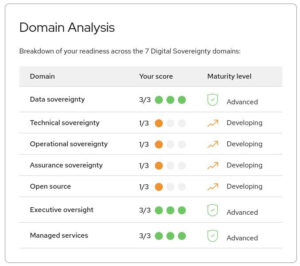Friday FOSS Week in Review
In many ways, FOSS news this week is like a soap opera with lots of stories being continuations from last week’s items. However, there is some new stuff to report. If you’re like me, all FOSS news is interesting….
Bartz Resigns from Yahoo Board
After being fired by telephone last Tuesday, Yahoo’s former CEO Carol Bartz resigned from the Internet company’s board on Friday. According to a Reuters report posted on Yahoo, the resignation was made public on Sunday and first reported by The Wall Street Journal:
“‘On September 9, 2011, Carol Bartz resigned from the board of directors of Yahoo! Inc., effective immediately,’ Charles Sipkins, a spokesperson for the board wrote in an e-mail on Sunday.”
It’s hard to imagine how Ms. Bartz will land on her feet after this fiasco. If she’d taken a few deep breaths and counted to ten before giving her interview to Fortune, it would be a good bet that she’d end up with another firm that needed someone not afraid to cut costs. As it is, it’s not clear at this time whether Yahoo will shell over the severance cash owed to her, estimated at around $14 million. I’m figuring she’ll probably get her money, and she’ll probably eventually find a suitable position somewhere, if she doesn’t decide it’s time to retire.
Where Yahoo will go from here is anyone’s guess, and I’ll do a little bit of wondering out loud about this next week.
More Linux Sites Breached
And then there were three….
Last week at this time we knew that kernel.org and been hacked, prompting Linus Torvalds to move work on Linux to Github. On Sunday, The H Security told us that Linux.org and LinuxFoundation.org have also been breached. The breach was discovered on September 8, and the folks at The Linux Foundation say it appears this security incident is connected with the incident that resulted in kernel.org being taken offline:
“The Linux Foundation’s servers, linuxfoundation.org and linux.com, and services associated with them such as Open Printing, Linux Mark and Foundation events, are all offline while the administrators perform a complete re-install on the systems. In the meantime the Foundation is advising users to regard any passwords and SSH keys used on these sites as compromised, and they should be immediately changed if they were used on other sites.”
As of this writing, all three sites remain off line, and the Linux Foundation has issued a statement indicating they’re working with law enforcement agencies to identify those responsible for these attacks.
The good news here is that the folks who run these sites are reevaluating their security protocols. Not only will this make kernal.org and the Linux Foundation sites more secure, they will very possibly come up with new online security techniques that might benefit us all. The bad news is that the likes of Microsoft and Oracle might see these incidents as ammunition for their FUD guns. If this does prompt a FUD attack, remember one thing: if Microsoft was breached in a similiar way, it’s unlikely that we’d ever know.
Russians Asked to Fund ReactOS
On Monday the BBC reported that Russian President Dmitry Medvedev has been asked to push 1 million euros into development of ReactOS, the open source Windows clone. Evidently, the request came from a student at a high school where the president was visiting.
According to the report, ReactOS, which will run all native Windows apps much faster than its Microsoft counterpart, is nearly ready for prime time:
“The venture’s project coordinator, Moscow-based Aleksey Bragin, said that the system was almost ready to go from the experimental to the available-to-all stage.”
Bragin said that the Russian president told the student that he’d give the proposal some conseration and that he thought the project “interesting.”
Certainly this is a project worth supporting. An open source version of Windows that works as well or better than the real thing could only be good for the free software movement.
‘The VAR Guy’ Answers FOSS Force’s Concerns
On September 5, I reported on the sale of The VAR Guy and three other IT sites to the publishing giant Penton Media. In the article, I expressed some concerns over whether the anonymous VAR Guy would continue to treat FOSS fairly. On Monday, The VAR Guy responded with a rather lengthy post titled Memo to FOSS Force: The VAR Guy Won’t Ignore Open Source.
As expected, in the article he promises to continue to treat FOSS products fairly, and outlines his history of serving the VAR (value added reseller) community as an objective reporter. What was most impressive to me wasn’t what he said in the article, but the fact that he thought it important to address the concerns I expressed. For the time being, I’m willing to give him the benefit of the doubt, but I’ll be keeping an eye open.
Is HTC Considering WebOS
Last week the big news in mobile was the rumor that Samsung might be considering adopting MeeGo. This week, we hear that HTC is considering purchasing WebOS from HP. Adam Dickter writing for Yahoo reports:
“Recent comments from the Taiwan-based company’s chairwoman, Cher Wang, have been interpreted as signaling that HTC is carefully considering webOS or another platform that could help it differentiate its devices.
“‘We have given it thought and we have discussed it internally, but we will not do it on impulse,’ Wang said in an interview with China’s Economic Observer. But she emphasized that the company was OK with its present strategy of personalizing its phones running other platforms by adding its HTC Sense interface.”
Some smart money guys have observed that WebOS might be a good fit for a handset maker who understands the market. Although HP’s offerings using the mobile OS didn’t fare well in the market, reviewers liked them a lot. Their failure, it’s reasoned, was due to HP’s lack of experience in the mobile market.
Obama Signs Patent Reform
Today, President Obama signed the America Invents Act, making it law. As far as my non-legal mind can tell, the most important part of the new law for FOSS is that it’ll make it easier for third parties to challenge a patent after it’s awarded. Grant Gross writing for PCWorld explains:
“Several large tech companies, including Intel, Apple and Microsoft, have called for patent reform in recent years, and lawmakers have been trying to pass a bill for nearly six years. Earlier this year, the Senate stripped out limits on patent lawsuit damages that some large tech companies had supported.
“The law streamlines the patent review process at the USPTO and it would change U.S. patent rules by giving a patent to the first person to file for it, not the first person to create a new invention. Changing to a first-to-file system puts the U.S. in step with most other countries.”
It’s certainly too soon to determine whether or not this will be good for FOSS and help solve some of our patent woes. Stay tuned….
Well, that does it for this week, I’ll see you on Monday. In the meantime, may the FOSS be with you….
Christine Hall has been a journalist since 1971. In 2001, she began writing a weekly consumer computer column and started covering Linux and FOSS in 2002 after making the switch to GNU/Linux. Follow her on Twitter: @BrideOfLinux



















